US Says Iranian Navy Boat Came Within 150 Yards Of Its Warships
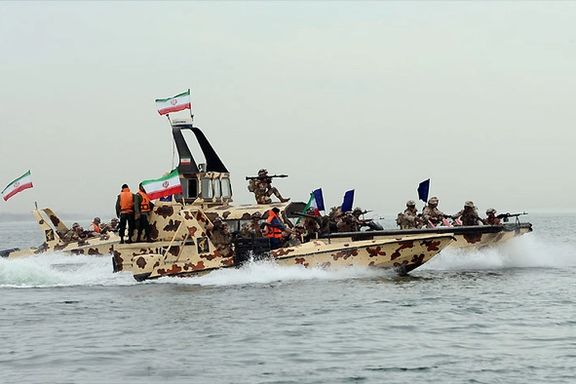
The US military said on Tuesday that an Islamic Revolutionary Guard Corps Navy boat came within 150 yards of American warships in the Strait of Hormuz.

The US military said on Tuesday that an Islamic Revolutionary Guard Corps Navy boat came within 150 yards of American warships in the Strait of Hormuz.
The US CENTCOM in a statement said that the situation was de-escalated with the help of audible warnings and non-lethal use of lasers.
The incident took place on December 5 during a routine transit in international waters. “The Iranian vessel attempted to blind the bridge by shining a spotlight and crossed within 150 yards of the US ships – dangerously close particularly at night,” CENTCOM said.
"The IRGCN’s actions violated international standards of professional and safe maritime behavior, increasing the risk of miscalculation and collision," the statement added.
Iran has engaged in provocative approaches to the US NAVY in the region many times throughout the years, with Americans firing warning shots on a few occasions.
“This dangerous action in international waters is indicative of Iran’s destabilizing activity across the Middle East,” the statement quoted CENTCOM spokesman Col. Joe Buccino as saying.
Expeditionary sea base platform ship USS Lewis B. Puller and guided-missile destroyer USS The Sullivans “were conducting a routine transit in international waters” when the Iranian patrol boat approached.
High-ranking Iranian commanders have been praising their navy this week as the true guarantor of security in the Persian Gulf region.
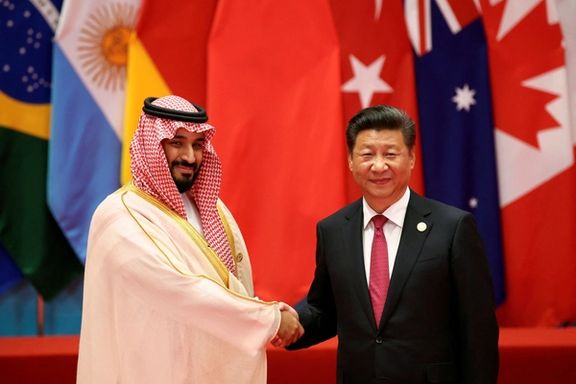
President Xi Jinping’s visit to Saudi Arabia, beginning Wednesday, marks China’s rising influence in the Middle East and the wider world.
Saudi official news agency SPA is calling Riyadh-Beijing relations a “strategic partnership” encompassing both rising trade and regional security, contrasting with United States officials portraying China as a threatening axis alongside Russia and bemoaning Saudi-Russian cooperation in agreeing oil production targets through Opec+.
Foreign Minister Wang Yi in October said Saudi Arabia was a “priority” for China. While this is due partly to supplying of 1.77 million barrels of Saudi oil a day (bpd) reaching Beijing in the first ten months of 2022 (18 percent of China’s total crude purchases), overall bilateral trade reached $87 billion in 2021 and China is keen to extend infrastructure investment in line with its 149-country Belt and Road Initiative (BRI).
Saudi Arabia’s plans to diversify away from oil and develop the $500-billion NEOM city in the north west are widely expected to offer significant opportunities for Chinese companies, who are already active in refining and petrochemicals.
Deeping ties with Saudi Arabia has not stopped Beijing continuing as Iran’s main oil buyer, taking between 500,000 and 1 million bpd this year, despite the threat of punitive action by Washington under the ‘maximum pressure’ Iran sanctions introduced in 2018. Both China and Saudi Arabia are uncomfortable by recent US assertions that its foreign policy is based on ‘human rights.’
China has a 25-year cooperation agreement with Iran, reached in 2021, but last month signed a 27-year liquid natural gas (LNG) supply deal with Qatar, which shares with Iran the world’s largest gas-field, the Qatari part known as North Dome and the Iranian part South Pars. Iran has struggled under US ‘maximum pressure’ to develop LNG facilities – the form of gas most suitable for export. French major Total, an LNG specialist, reluctantly pulled out 2018 from a contract to develop phase 11 of South Pars.
‘Leveraging rivalry’
Saudi Arabia, like China, seeks a transactional foreign policy. The Chinese are this week reportedly ready for $30 billion in arms contracts with Riyadh, reflecting Saudi Arabia’s position as the third largest defense spender in the world after the US and China. Riyadh bought 23 percent of all US weapons sold globally 2017-21, according to the Stockholm International Peace Research Institute.
Xi’s visit will also include an inaugural China-Arab Summit, which is expected to include leaders from the countries of the Gulf Cooperation Council and the wider Arab world, including Iraq.
Iran and Saudi Arabia despite a few rounds of exploratory talks still do not have diplomatic relation severed in early 2016. Tehran continues to label Riyadh as an enemy and periodically makes threats against the Sunni power, which considers Shia Iran a threat.
While some Persian Gulf observers continue to insist that nothing has diminished US sway in the region, John Calabrese of the Washington-based Middle East Institute in a briefing published Monday wrote that “Saudi Arabia and its Gulf Arab neighbors …situated both literally and figurately at the crossroads of intensifying global rivalry between US and China…seek to leverage [that rivalry] to their benefit.”
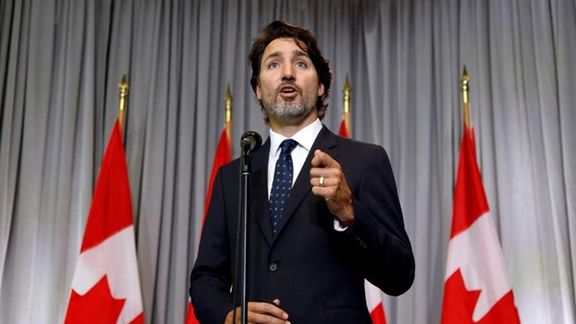
Prime Minister Justin Trudeau said Monday Canada would investigate how parts from an Ottawa-based company were reportedly found in an Iranian military drone.
Trudeau said he did not want Canada’s “extraordinary technological innovations” used in “Russia’s illegal war in Ukraine, or Iran’s contributions to that.” He argued that Ottawa had “strict export permits in place for sensitive technology” and would work with Tallyman Wireless to “figure out exactly how items that we’re not supposed to get into the hands of anyone like the Iranian government actually ended up there.”
Canada’s arms exports – which before Moscow’s 2014 Crimea annexation included Russia – are regulated by the Export and Import Permits Act, under which there is a list of ‘approved buyers’. In 2021, 66 percent of Canada’s military sales went to the Middle East, with the lion’s share of $1.75 billion bought by Saudi Arabia.
Many parts used in military drones, however, are readily available and often bought online. The presence of Canadian-made antennae in the Shahed-136 drone was asserted last month in an investigation by Statewatch, a group committed to transparency in government.
Trudeau raised the issue with reporters Monday after a report in the Globe and Mail. Statewatch had cited Ukrainian intelligence claiming the Shahed-136 had parts from over 30 European and American companies, mainly from the United States. Ukraine’s attack Monday on two military bases deep inside Russia used Soviet-era drones, the Kremlin said.
Military drones have been deployed by both sides in the Ukraine war, with Ukrainian forces using mainly US and Turkish drones, or UAVs (unmanned aerial vehicles). The increasingly use of drones in conflicts across the world reflects their low cost compared to missiles or jet-planes.
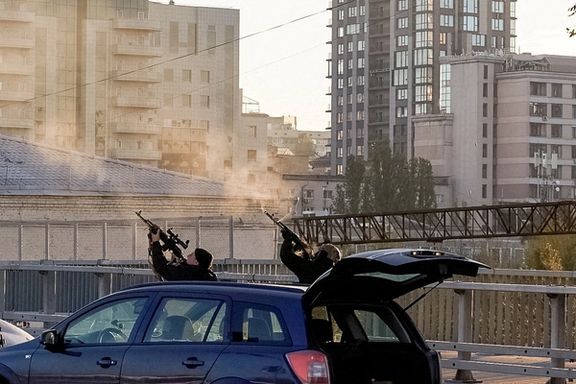
Sanctions, winter
Canada on December 2 sanctioned Baharestan Kish, an Iranian research company, over alleged involvement in supplying drones to Russia. Ottawa had in November sanctioned two Iranian companies on the same grounds, while the US and European Union listed Iranian entities in October.
With temperatures in Kyiv currently minus 5 Celsius (23 Fahrenheit) and snow looming, there are stories of the infamous Russian winter playing havoc with sophisticated weapons. The Ukrainian military has reported that Moscow has not deployed Shaheed drones since November 17 as they cannot function in freezing temperatures.
Other Ukrainian officials have, however suggested Moscow has simply run out of stocks. Iran in early November acknowledged it had supplied “a small number” of military drones to Russia before the current phase of conflict broke out with Moscow’s ‘special military operation’ in February. There have been mixed signals in recent days over prospects for peace talks between Russia and the US to end the war.
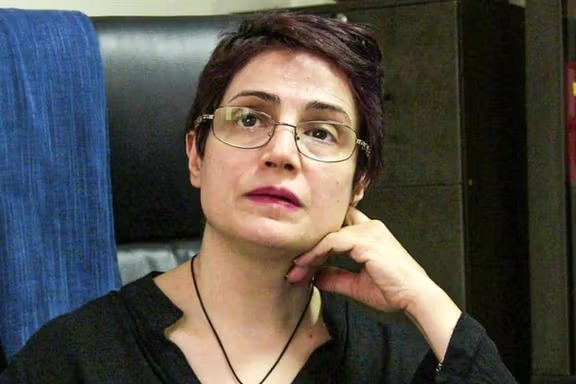
Two prominent Iranian lawyers have called for the unconditional release of all detained protesters and the cancellation of all convictions and sentences.
Nasrin Sotoudeh who is in prison and Mohammad Seifzadeh in a joint letter said revolutionary courts “do not have legal authority,” emphasizing that proceedings in such courts are not “fair and judges are not impartial.”
Hours before the publication of this letter Iran's Chief Justice Gholam-Hossein Mohseni Ejei said the death sentences for several protesters have been confirmed and will be executed soon.
The letter is one of the first reactions to the threatening statements made by the Chief Justice on Monday.
The two human rights lawyers also added that most of those arrested were “convicted in revolutionary courts…where they were deprived of the right to have an independent lawyer, and also due to lack of fair proceedings in the judiciary and the impartiality of the judges, the verdicts are completely invalid.”
Based on leaked briefing documents for senior officials from Fras News Agency, over 29,000 people have been arrested during nationwide protests against the regime following the death of Mahsa Amini.
None of the detained had the right to choose a lawyer, and a number of them have been tried and sentenced to death without access to a fair trial.
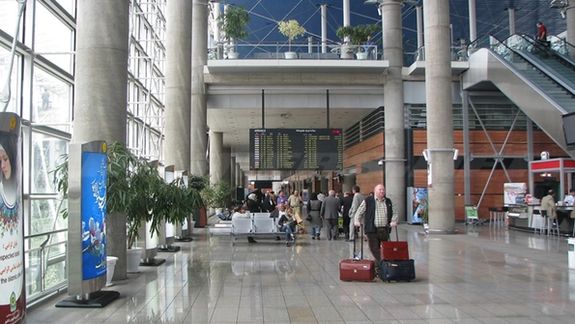
Amid nationwide protests, economic hardship and uncertainty about their future, more Iranians are emigrating, with Oman as a new favorite destination.
The accelerating exodus is not limited to medical and engineering professionals anymore as many business owners have also started to transfer their businesses to nearby countries where trade transactions are easier, especially to the Persian Gulf littoral states.
According to a recent article in the Tehran newspaper Arman Melli, during the past year about 30,000 personnel of different medical professions, including doctors, nurses, and paramedical technicians, have applied for Certificates of Good Standing with intent to immigrate to Oman. The paper claimed that within the last four years, 16,000 general practitioners have left the country. The high number of emigrations has become so alarming that the officials of medical organizations have warned of serious shortages of doctors in the near future.
In April, Iran's Medical Council said about 4,000 doctors have applied for Certificates of Good Standing in the previous 12 months with the intent to leave the country. Council spokesman Reza Laripour said that the annual number of such applications was less than 600 between 2013 and 2015.
Head of the Medical Council of the Islamic Republic, Mohammad Raeeszadeh, said, "The medical community faces fundamental challenges in some specialties, so that we may not have graduates in some fields in the future.” He warned of the risk of regression to 40 years ago when it had to hire foreign doctors to meet domestic needs.
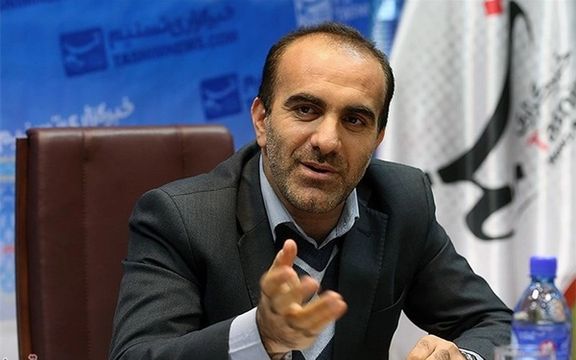
Lack of a promising future is the main reason why professionals decide to leave. Incomes have sharply declined in the past years as Iran’s currency has lost its value by more than tenfold, and the state seems to become more inept and arbitrary in governing the country.
On the backdrop of Iranian doctors emigrating in droves, the health ministry in September increased the exit permit bond for medical, dental and pharmacy students to $5,000 per year. Deputy minister for education at the health ministry, Abolfazl Bagherifard, said that students in graduate levels should provide 1.5 billion rials ($5,000) to leave the country for a year and undergraduate levels should provide bonds worth $2,000. Students must provide an official letter of commitment to return as well as another person's guarantee by depositing a real estate bond or a bank guarantee.
Experts and social scientists in Iran and abroad have told the media that the brain drain in the past few decades, beginning with the 1980-88 war with Iraq, has been accelerated by lack of social freedoms in the clerical-dominated system, political upheavals, deterioration of the economy, and government repression.
The government has stepped up pressures and restrictions on students and graduates. Late in November, the parliament presented a proposal to ban students who participate in protests from traveling abroad for ten years. Recently, the Ministry of Science Research and Technology has also approved regulations that would increase the costs of receiving university degrees six to 10 times.
All Iranians who study in government universities must work about twice the duration of their studies for a state institution before they can get their certificates. If they opt out of working for the government, they should pay the cost of their education to get their document. As per recent regulations, the fees to get their degrees have increased up to 10-fold.
However, even those measures are not enough to stop Iranians from leaving the country, with many families deciding to either send their children abroad before starting university or forgetting about getting a degree altogether. Ali Sharifi-Zarchi, a professor at Tehran’s Sharif University of Technology, believes that the new measures would even accelerate emigration, saying that the new fees mean that the government is urging students to forget about Iranian universities and study abroad where they can find a job and help pay for their expenses.
Almost half of Iranian youth want to leave the country amid pessimism about their future, a recent opinion survey conducted from abroad shows.
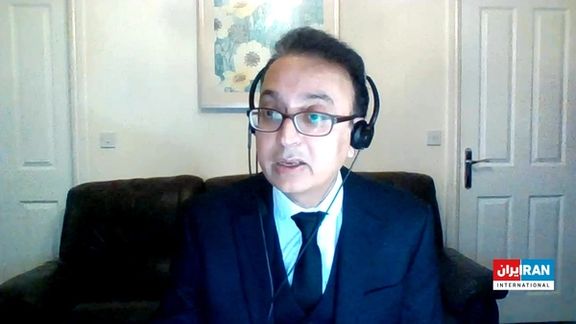
In an Iran International interview Javaid Rehman has outlined his plans for a UN probe into an “unprecedented level of violence and state brutality in Iran.”
Rehman, the United Nations Special Rapporteur on Human Rights in Iran, said the “independent and international” fact-finding mission established by a UN Human Rights Council vote November 24 would focus on Iran’s high number of executions, including drug offenders, “the killing of children and ethnic minorities,” and establishing accountability of individuals.
Rahman said 21 people involved in protests had been indicted on crimes carrying the death sentence, and at least “15,000 protestors arrested.” He applauded the Human Rights Council for “listening to the Iranian people,” and explained that he would be working very closely with the investigation given his “expertise and knowledge.” Rehman, a Pakistani-British legal scholar based in London, has been special rapporteur since 2018 but, unlike a UN special rapporteur on the human-rights consequences of sanctions, has not been allowed to visit Iran.
The UN mission, which reportedly will have a $3.67 million budget and 15 staff, would collect and preserve evidence for future prosecutions, dismissing “mis-information” and using the experience of members, Rahman said. He envisaged a detailed report by February-March 2024 for the council’s 55th session.
Accountability for human rights violations would come, he told Iran International, through “future legal proceedings” in international courts and through cases in national courts on the principle of universal jurisdiction. “These individuals better be careful because we are going to hold them accountable in courts of law,” he said.
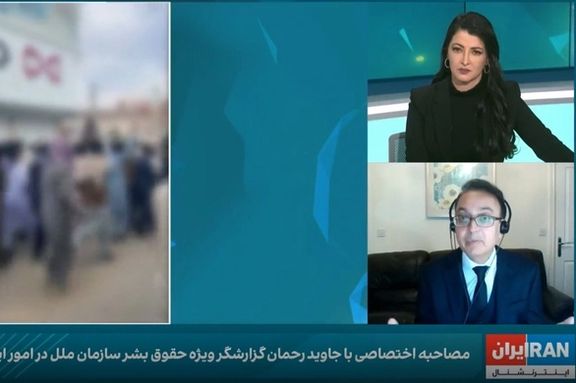
National courts have been generally reluctant to apply universal jurisdiction, with the United States among those world powers most resistant to the principle. In recent instances a Swedish court in July sentenced to life imprisonment Hamid Nouri, a former Iranian official, over 1988 prison executions, and in January a German court jailed for life Anwar Raslan, a former Syrian intelligence office, for murder and rape of prisoners in Damascus. Rahman did not explain any potential role of the International Criminal Court, which has generally indicted Africans and which the US has refused to join, insisting for example it has no jurisdiction over US troops in Afghanistan.
‘Key principles’
In his interview with Iran International’s TV correspondent and host Sima Sabet, Rehman criticized the Iranian constitution, which he said “violates democratic norms, violates key principles of constitutionalism,” including a lack of separation of powers. He called the judiciary’s role “problematic” and said one of his “big concerns” was women being excluded from “serious political positions.”
Looking ahead to the work of the UN mission, the special rapporteur welcomed submissions from victims of violence, and also from journalists and their families receiving threats “in the UK, European and north American countries.”
“That is what the Islamic Republic is all about,” Rehman said. “It wants fear to be spread…The Islamic Republic of Iran wants a complete blackout of the news.” Rehman encouraged Iran International to “continue your excellent work.” He noted that in contacts with Iranian officials, they had accused him of “talking to terrorists” and “not being objective.”